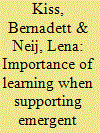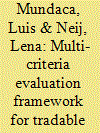| Srl | Item |
| 1 |
ID:
109691


|
|
|
|
|
| Publication |
2011.
|
| Summary/Abstract |
The role of policy instruments to promote the development and diffusion of energy efficient technologies has been repeatedly accentuated in the context of climate change and sustainable development. To better understand the impact of policy instruments and to provide insights into technology change, assessments of various kinds are needed. This study analyzes the introduction and development of energy efficient windows in Sweden and the policy incentives applied to support this process. The study focuses on the assessment of technology and market development of energy efficient windows in Sweden; and by applying the concept of learning, it assesses how conditions for learning-by-searching, learning-by-doing, learning-by-using and learning-by-interacting have been supported by different policies. The results show successful progress in technology development and an improvement in best available technology of Swedish windows from 1.8 W/m2 K in the 1970s to 0.7 W/m2 K in 2010; in the same time period the market share of energy efficient windows increased from 20% in 1970 (average U-value of 2.0 W/m2 K) to 80-85% in 2010 (average U-value of 1.3-1.2 W/m2 K). The assessment shows that various policy instruments have facilitated all four learning processes resulting in the acknowledged slow but successful development of energy efficient windows.
|
|
|
|
|
|
|
|
|
|
|
|
|
|
|
|
| 2 |
ID:
092764


|
|
|
|
|
| Publication |
2009.
|
| Summary/Abstract |
Recent years have witnessed regained political momentum on energy efficiency and interest in establishing markets is growing. As a result, Tradable White Certificate (TWC) schemes of differing design have been implemented in Great Britain, Italy and France. Much attention is being paid to justifying and evaluating such schemes. In this paper, we develop and apply a multi-criteria framework for evaluating TWC schemes-an approach that attempts to cover their individual design features. A broad evaluation is conducted regarding energy-saving and environmental effectiveness, economic efficiency, cost-effectiveness, transaction costs, political feasibility, administrative burden and technical change. The results show the design and performance of TWC schemes to be case and context-specific, and generalisations are thus inappropriate. This evaluation supports the cost-effectiveness modelled for the British scheme and the assumption that a TWC scheme is an economically efficient policy instrument. For the other, more complex TWC schemes, more data and experience are needed to judge their ex-post merit. On the whole, the proposed multi-criteria evaluation requires considerable data and complementary methods. However, the framework improves the understanding of the broad effects and attributes of TWC schemes. It deals with various empirical and normative aspects that can be applied in their evaluation.
|
|
|
|
|
|
|
|
|
|
|
|
|
|
|
|